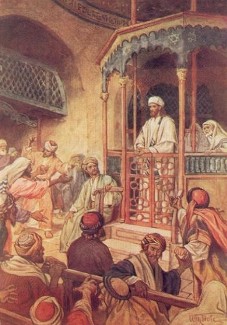Cultures assess themselves with different criteria. We tend to assess ourselves and others using economic criteria. What we possess or lack shapes our social standing and self-worth. We use other criteria, too, but we seem to give socioeconomic data first place.
My visit over 20 years ago to the mission-parish of the Archdiocese of Detroit in Recifé, Brazil, allowed me to see how wealthy poor people are. The people I met were wealthy in hospitality, happiness and faith. My visit opened my eyes to wealth that is more valuable than money. Those among us who have visited Honduras over the years can say something similar. My visit to Recifé, Brazil, opened my eyes to God at work now in me. My visit helped me see one way today’s readings are related. Let me begin with the gospel.

Wealth affected ancient Mediterraneans. Yet, they assessed themselves even more by
honor and shame.
Honor came with birth, and people rarely moved beyond the status bestowed by birth. Craftsmen, for example, took pride in making things so that
without them no city could be lived in, and that they did not need to worry about hunger.
/1/ Jesus’ father was a craftsman;
carpenter suggests to us a more specific occupation using wood, but in Palestine stone was more available than wood and less costly.
The social expectation was that Jesus, like any son, would continue his father’s work. Craftsmen were necessary, and the idea of doing something different was an alien thought in that culture. Yet, a Jewish man was free to study
torah and become well-versed in those holy writings. Still a craftsman—who spent hours at his work and often traveling—did not have the time other men, like scribes or those born into affluence, had to devote to studying the holy writings and the discussions of rabbis preserved for generations.
While Jesus astonished many by his ability to cite scriptures, as well as to converse about and teach them, the majority of people could not give Jesus any more
honor than that of a craftsman.
If
honor was key in assessing self and others in Jesus’ culture, then shame was its other side. The gospels make clear that Jesus held his own in all kinds of conversations. In the one we just heard in which some withheld from Jesus a
prophet’s
honor, Jesus quickly took the wind out their sails:
A prophet is not without honor except in his native place and among his own kin and in his own house.

If I stopped here I would be simply rehearsing cultural history and how people ascribed
honor or not, and how people defended it. What does it offer us now? As fully human, Jesus felt the sting of
honor withheld, even though he could defend himself. Defense doesn’t always guarantee acquittal, after all. Jesus was not immune to human hurt or the need for affection. When others left Jesus and he asked his apostles,
“Do you also want to leave?”/2/ Jesus was not speaking rhetorically. He felt vulnerable and its painful effects.
Vulnerability in any culture is not easy to tolerate and more difficult to manage. St. Paul also knew vulnerabilities, and one in particular haunted him. Its more than difficult to diagnose someone dead for almost two millennia, plus the distance between his culture and ours makes the effort extremely hazardous. What we can learn from St. Paul is that he used his
weakness to remain closer to God, who had vindicated God’s son from a shameful death by raising Jesus to unending life!
The value for us in both Jesus and Paul—with his constant focus on Jesus—is the courage they give us to look differently at our vulnerability: our limits; our foibles; our compulsions; our sinfulness. That difference is to see our vulnerability as a
grace to taste God’s consoling presence, instead of how the world would have us see it, as worthless
weakness and a shameful blot on our humanity. That is wealth more valuable than money.
In your daily 15 minutes with Jesus this week, pause in the presence our triune God. Ask St. Paul to present you to Jesus, who was intimately acquainted with human
weakness. Converse with Jesus: renew your confidence that Jesus was often vulnerable; then speak to him about your
weakness. Ask for new courage to see your
weakness honestly and to appreciate it as an opening for Jesus to work in and through you. Close by saying slowly the
Lord’s Prayer, savoring its phrase
deliver us. With that phrase we pray not that God change our circumstances but that God work more powerfully and make us channels of God’s life for and with others to
honor and glorify God.
_____________
1. Sirach 38.32. Chapters 38.24-39.11 vividly describe honor and people’s roles in life.
2. John 6.67.
______________________________________________
Wiki-images of Jesus teaching in a synagogue and of a most important papyrus of Paul's words about weakness and grace heard today are in the public domain. [Learn more about Papyrus 46.]
 The site also has an Interests tab along the top and near the right-end of the series of tabs located their.
The site also has an Interests tab along the top and near the right-end of the series of tabs located their.







